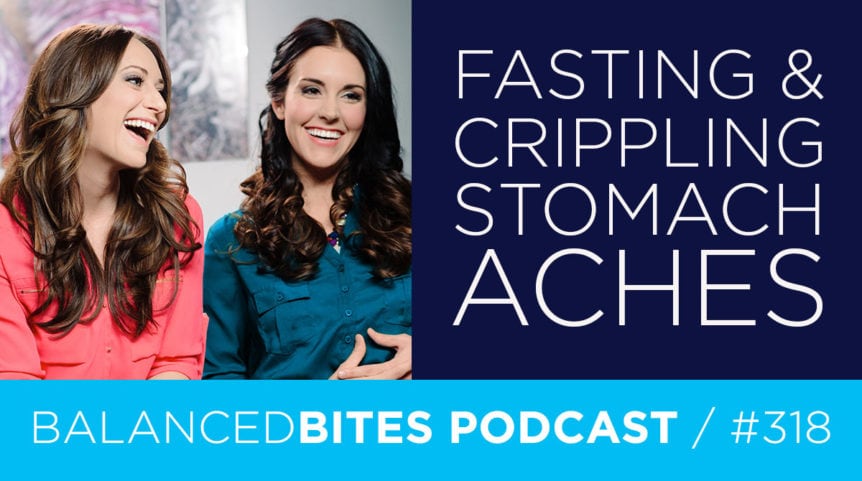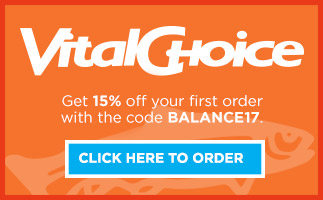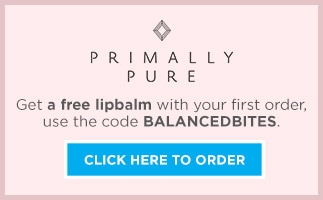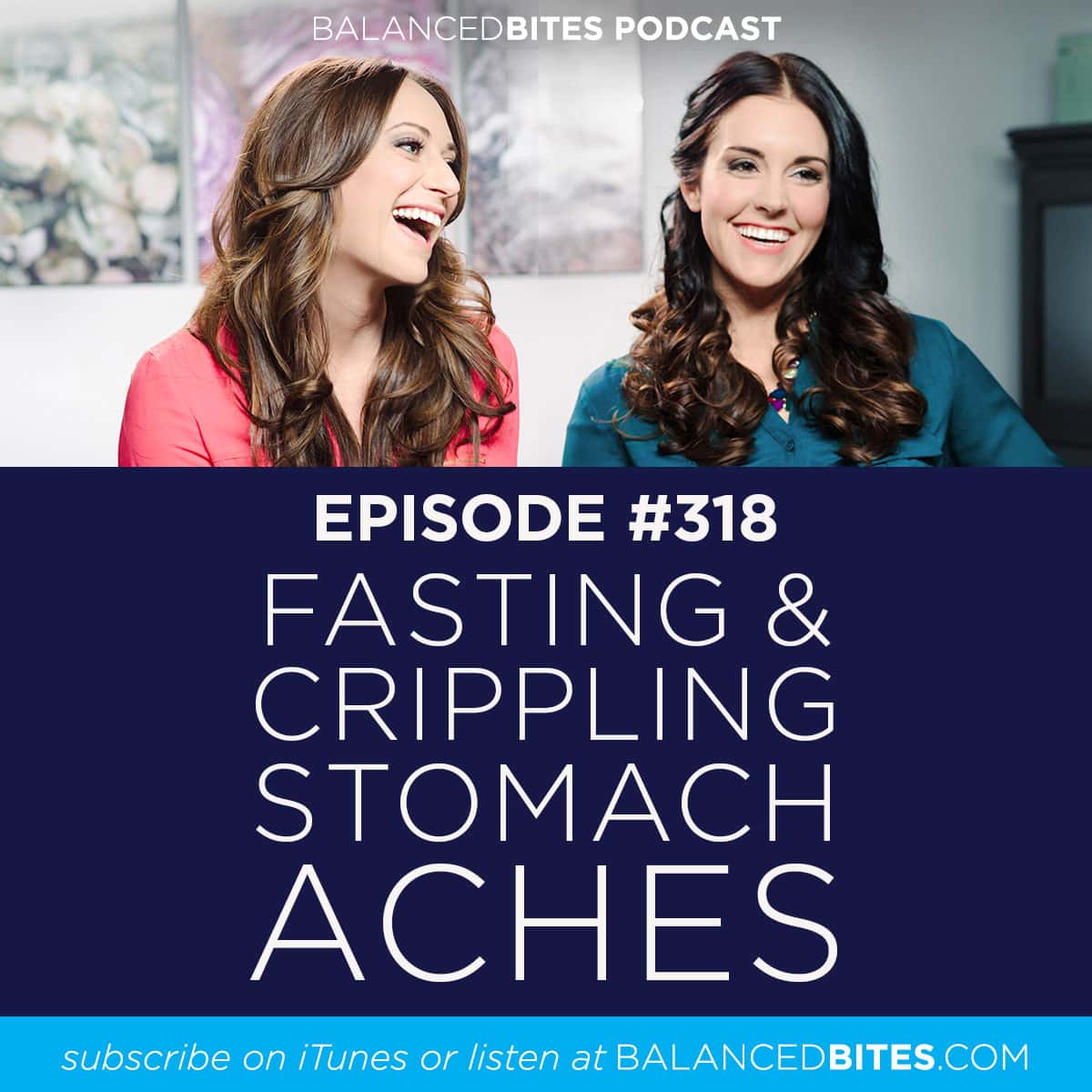 Topics
Topics
- News and updates from Diane & Liz [1:53]
- Safer skincare and retinoids [10:02]
- Digestive issues and warm foods [20:44]
- Fasting for digestive issues [29:47]
- Closing thoughts [33:54]
Subscribe to DianeSanfilippo.com
The episodes are also available in iTunes, Spotify & Stitcher.
![]()
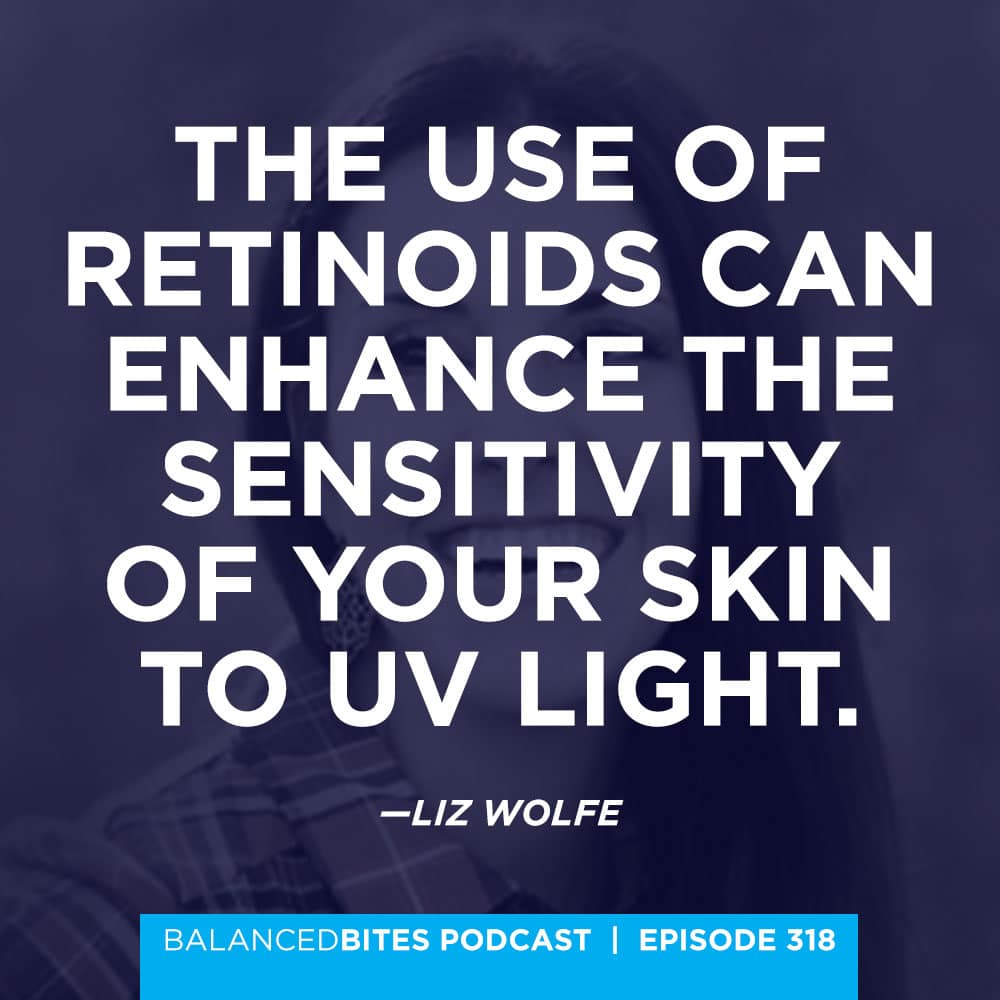
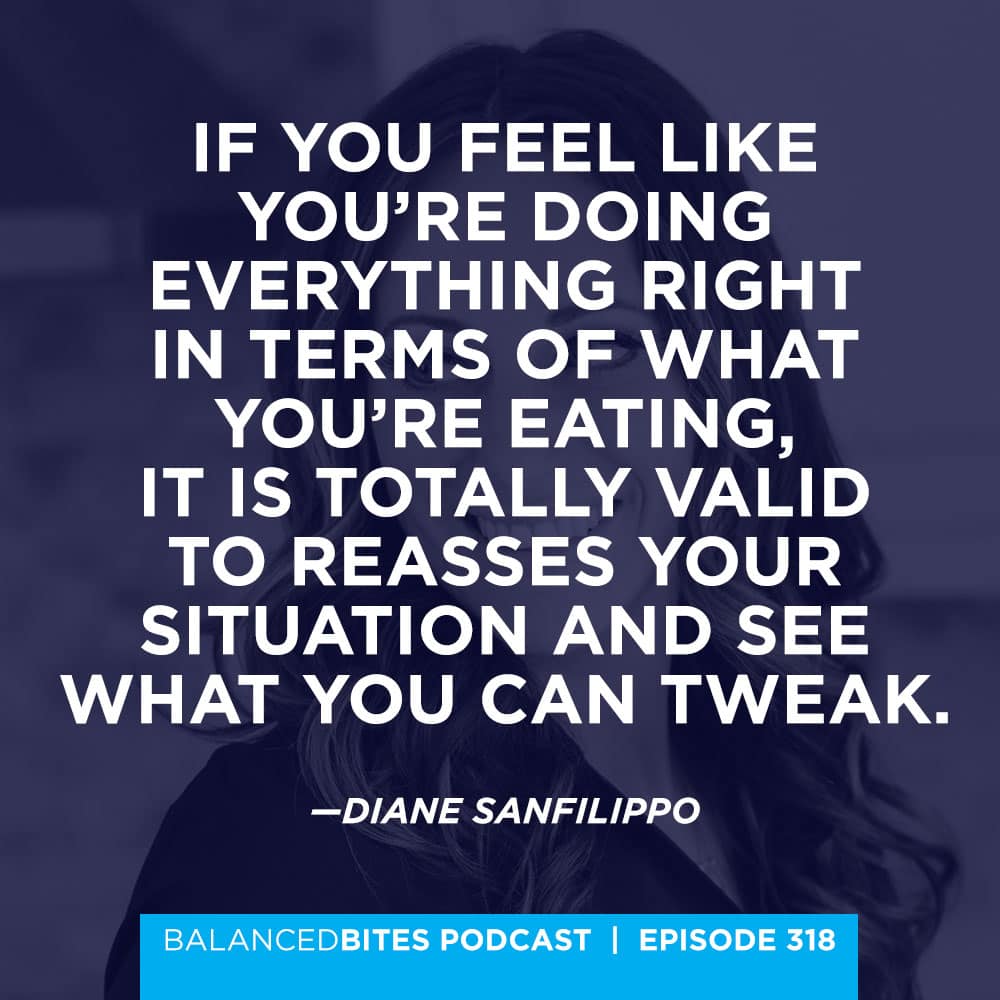
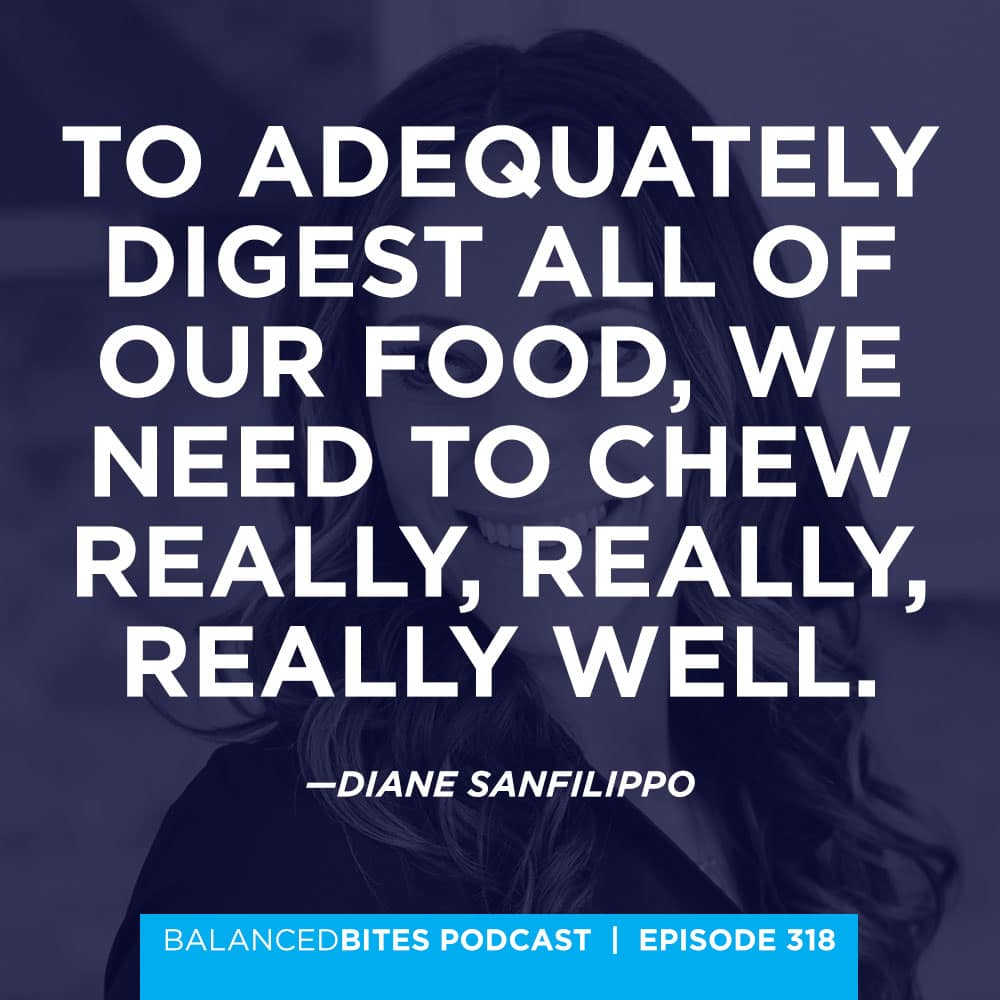
You’re listening to the Balanced Bites podcast episode 318.
Diane Sanfilippo: Welcome to the Balanced Bites podcast. I’m Diane; a certified nutrition consultant, and the New York Times bestselling author of Practical Paleo and The 21-Day Sugar Detox. I live in San Francisco with my husband and fur kids.
Liz Wolfe: I’m Liz; a nutritional therapy practitioner, and author of the Wall Street Journal best-seller Eat the Yolks; The Purely Primal Skincare Guide; and the online program Baby Making and Beyond. I live on a farm in the mystical land of the Midwest, outside of Kansas City.
We’re the co-creators of the Balanced Bites Master Class, and we’ve been bringing you this award-winning podcast for nearly 6 years. We’re here to share our take on modern paleo living, answer your questions, and chat with leading health and wellness experts. Enjoy this week’s episode, and submit your questions at http://blog.balancedbites.com or watch the Balanced Bites podcast Instagram account for our weekly calls for questions. You can ask us anything in the comments.
Remember our disclaimer: The materials and content within this podcast are intended as general information only, and are not to be considered a substitute for professional medical advice, diagnosis, or treatment. Before we get started, let’s hear from one of our sponsors.
Liz Wolfe: The Balanced Bites podcast is sponsored in part by the Nutritional Therapy Association. The NTA trains and certifies nutritional therapy practitioners and consultants (including me; I’m an NTP), emphasizing bio-individuality and the range of dietary strategies that support wellness. The NTA emphasizes local, whole, properly prepared nutrient dense foods as the key to restoring balance and enhancing the body’s ability to heal. Nutritional therapy practitioners and consultants learn a wide range of tools and techniques to assess and correct nutritional imbalances. To learn lots more about the nutritional therapy program, go to http://www.NutritionalTherapy.com. There are workshop venues in the US, Canada, and Australia, so chances are you’ll be able to find a venue that works for you.
1. News and updates from Diane & Liz [1:53]
Liz Wolfe: Ok. So, Diane. Hi buddy.
Diane Sanfilippo: Hi.
Liz Wolfe: Can I ask you a big favor, not to take out chunks of text in the words that I’m reading while I’m reading them. {laughing}
Diane Sanfilippo: Well, I didn’t mean to. But the document still said nearly 6 years, and it’s been more than 6 years.
Liz Wolfe: Oh, ok.
Diane Sanfilippo: I know this, because we’ve been friends for more than 6 years. But you're so good at sticking to the script. Which, this is perfect for our personalities. You're so good at sticking to the script, that you read it. And I was like, oh. Nope. Nope. But we just didn’t get it updated.
Liz Wolfe: Yeah, I don’t. You know. What’s that thing? I don’t do things on the fly.
Diane Sanfilippo: {laughs}
Liz Wolfe: I could never have been a line cook. I could never have done anything on the fly.
Diane Sanfilippo: Extemporaneous speaking. That’s the word that you taught me.
Liz Wolfe: Extemporaneously?
Diane Sanfilippo: Extemporaneous speaking. Hmm-hmm.
Liz Wolfe: That’s a little different.
Diane Sanfilippo: Whatever. Anywho.
Liz Wolfe: So what’s up with you?
Diane Sanfilippo: So what’s up?
Liz Wolfe: Yeah.
Diane Sanfilippo: So what’s up is final, final, final, final edits of the new book are getting finalized now. I’ve been kind of working on getting some of the details for the design nailed down. Because as folks may or may not know, I don’t {laughs} I always want to quote Coming to America when I list off multiple hats that I wear. I write my own songs. I produce my own songs.
Liz Wolfe: {laughs}
Diane Sanfilippo: Anyway. This is like obscure movie quotes that I like that you don’t always know. Hopefully some of our listeners know it. Anyway. I write my books, and edit, and I also work with the designers. There’s a designer on our team, Moriah, who worked a lot on the mockup for it. But I work with the publisher really closely on the design, because it’s super important to me that it’s visually just so. And yeah. That’s kind of the stage we’re at. The content is all there. We’re just kind of getting it; I don’t know. Just a little spruced up.
And I’m super excited. I showed a sneak preview on Instagram, what will now be a couple of weeks ago, or a week ago or so. And I’ve been showing it to our 21-Day Sugar Detox coaches, little sneak peaks. And they’re super excited about it. Which is really fun, because those are the folks who really are very; I don’t know. They have a very intimate knowledge of this program and all of the materials. So for them to get super excited about it makes me very happy. And I feel like this was; I don’t know. Just the right direction. And it’s been a long time coming. We’ve been working on the concepts and everything for this for well over a year.
It’s just exciting to have it come to fruition. And I do feel like I’ve handled this process in a more balanced way this time than the previous four. Each time it gets a little bit easier, so that’s kind of comforting. I mean, I guess that’s probably why some women have like four and five kids. {laughs} They just, maybe they get better at it. I don’t know. It just gets easier. They forget the pain. Something happens.
But yeah. So anyway. That’s kind of the big news around here. And big changes coming down the pipeline for the online program. You guys will hear all about that. I have a ton of freebies coming for people who preorder or who grab the book the first week it’s out. If you come to an event or any of that. So I’ll give you guys more details on that, because I know. I am going to have some tour dates, and some of them won’t be the first week, obviously. But I’ll have a way for those of you who are coming to a later tour date to grab the book in person and also get some of the freebies. Because I don’t want to have you guys miss out and feel that FOMO. But you're going to love it. So I’m super excited about that.
That’s kind of the big stuff. Figuring out the book tour. I know something that’s new with both of us.
Liz Wolfe: Mm-hmm.
Diane Sanfilippo: But maybe you want to talk about it. I don’t know. What’s new over there, on your side of the computer screen?
Liz Wolfe: Well, the thing that you and I have been talking about for weeks is Beautycounter holiday sets. Right? That’s what you meant?
Diane Sanfilippo: I’ve been wearing so much makeup, just because I want to put this makeup on all the time.
Liz Wolfe: I know. I stopped wearing makeup until I found the Beautycounter stuff. Because it was either stuff like didn’t last long enough to be worth putting on my face. {laughs} Because it’s like, I’m not going to spend the time to put this stuff on if it’s not going to stay on, and look good.
Diane Sanfilippo: Yeah.
Liz Wolfe: And I seriously feel like I can credit Beautycounter makeup. And this is even before the holiday palettes that are so amazing. But I kind of credit Beautycounter with making me do a little bit more self-care. I don’t’ know. For a lot of people, putting on makeup doesn’t feel like selfcare. But I first tried the foundation, and then I started trying everything else. And now that’s the only thing in my makeup bag. I use a couple of different brands for skincare. Because folks know that I’m really passionate about that. And I’ll use a couple of different brands. But I really only use Beautycounter makeup, because it’s so good.
Diane Sanfilippo: Yeah. I remember last year at this time, and then also back in May when people were asking me a lot of questions when I was starting to talk about it more. I just wasn’t ready to get rid of a lot of the cosmetics that I had. And even last year on book tour with Cassy Joy, we were both kind of; we had our Beautycounter lipsticks. The lip sheers and lip glosses and all of that. But they were not the brightest, most vibrant colors. And then we just got these new lip intense colors. And I’m putting them on, and I’m like. Yes! This is what I wanted.
Liz Wolfe: They’re so good.
Diane Sanfilippo: And the eyeshadows. I’ve been totally a MAC eyeshadow person. And no joke, though, I’ve probably had the colors I have in my bathroom that I’m going to be; well, now this will have already happened, but throwing away live on video today. But I’ve probably had those for more than 5 years.
Liz Wolfe: Yeah.
Diane Sanfilippo: Because I don’t know, I don’t go through them that fast. But I’m super excited because these eyeshadows are actually legit.
Liz Wolfe: They’re so good.
Diane Sanfilippo: I’m actually really impressed, too. Like, how did we do that?
Liz Wolfe: It’s all Christy Coleman, I feel like. Oh my gosh, here’s a little tangent here. I’m looking out the window at my house. And we have this pigeon; this albino pigeon. We’re in the middle of the country. Pigeons are city birds, right?
Diane Sanfilippo: I guess.
Liz Wolfe: It’s like this albino pigeon that has like adopted our property. It’s so weird.
Diane Sanfilippo: I think we need a picture of that on Instagram. Please post to Instagram.
Liz Wolfe: I know I’ll have to capture that. My chickens just chased it away. But it’s been here for a couple of days. I feel like it’s going to stick around. So I digress a little bit. But if folks don’t know, the reason that we love; or one of the reasons we love Beautycounter so much. It’s definitely a performance thing. This is very much like traditional, high performance makeup. But it’s also the fact that they’re leading the industry in heavy metals testing, in safety screening. And that’s really, really important to me. To us. So that’s been a really big deal for us.
Diane Sanfilippo: Yeah. I mean, it goes right along with the stuff we talk about on the show all the time with just health in general. And we know so many people are dealing with toxicity issues. Liver toxicity. Heavy metal testing that people are doing. And maybe changing their food or other environmental factors, and maybe not realizing what could be in their skincare products.
Liz Wolfe: Yeah.
Diane Sanfilippo: So I think it definitely is related there.
Liz Wolfe: And even in just providing this other option for folks. I do love natural skincare. That’s where I started out. And there are a lot of natural and organic ingredients in Beautycounter products. But the standard is safety. It’s screening and safety. And that’s really, really important.
And I realized a while back that some folks actually react to the natural stuff. Sometimes it’s the natural compounds found in some of the oils and extracts that people use. People react to it. Other people do beautifully with it. I’m somebody that can kind of combine both. But even, for example, my kid. We can’t even use lavender oil on her. It’s just too; something about it is too strong, too potent. She’s sensitized to it. So there’s really, at this point, I like being able to recommend something for everyone. And how much it’s caught on, it’s really been a no-brainer. So there you go.
2. Safer Skincare and Retinoids [10:02]
Diane Sanfilippo: Alright. So, we’re going to roll into a safer skincare segment, where we answer some of your questions about safer skincare, not specific to any product. But just kind of the questions in general. One came in recently here that I’m going to read so that you can kick us off on this one. It’s actually from another Elizabeth. This one says, “Liz. You mentioned you don’t like the use of retinols. In the future, would you all consider a topic of discussion on the podcast as to why you don’t? Or maybe even why you don’t like the dermatological products, non-regulated makeup, and the harm they can cause. I was researching to see if y’all had done anything like this, and I may have overlooked it.”
Liz Wolfe: So, I’m going to tackle the retinol question, before anything else. This is a really interesting question for me, and something that I had been trying to tackle for years. Way back when I first got this question about, well, are retinols so bad? They’re vitamin A. This actually came out of folks asking if they could take cod liver oil and still use their topicals retinols, just because people were worried about vitamin A toxicity. And years ago, I started to research the mechanism by which retinols work.
Because retinols are basically vitamin A; I don’t know if you would call them derivatives. But they’re vitamin A type compounds that make your skin cells turn over more quickly. So they’re great for getting rid of wrinkles. For a lot of people they’re great for acne. Retinols are just kind of ubiquitous. So, retin-A. Accutane is a form of vitamin A that you take internally. But it’s very different, I think, than topical retinoids.
So we’re going to talk about topical retinoids. I don’t begrudge anybody using Accutane. I know our friend, Juli, from PaleOMG used Accutane and it solved her many-years battle with really stubborn acne. And she does not regret it. They come with a lot of warnings. You have to be really cognizant of. You know, using birth control. Etc. Etc. So I’m not saying folks should not use Accutane. That’s not even what I’m going to tackle here.
But topical retinoids can really make your skin look nice. That’s just; that’s just the long and short of it. But it’s one of the ingredients that Beautycounter bans and that ranks very poorly, I believe, with the Environmental Working Group. And this issue is kind of interesting. Because number one, for a long time it was hard to find any information on the mechanism of action of retinols and how they improve the skin. I don’t know that it matters so much what the mechanism of action is anymore.
I’m not as consumed with figuring that out as I am with the question of why do we see in some of the science that retinols might be dangerous?And the reason that this ingredient is banned by Beautycounter, and the reason that a lot of people don’t like it, is because it looks like the use of retinoids can enhance the sensitivity of your skin to UV light. So basically you see; I hope I’m summarizing this correctly. Because I have a ton of ingredients spinning around in my head right now. But I’m pretty sure with retinols we see mutagenic changes to skin cells. Like pre-cancerous type changes to skin cells that are associated with the use of retinols.
So, that’s kind of the drum, I think, that a lot of folks beat when we’re talking about retinols being potentially unsafe. Now, what I’ve kind of concluded over the last six months to a year. And I’m not a dermatologist. I don’t play one on TV. I am really interested in the why. The compounding factors. The context of things like this. And to me what it looks like is when you're using retinols without being really conscientious about sun protection or light exposure, that’s when we see problems.
So the reason I really dislike the use of retinols or retinoids, whether prescription grade or not. No, I’m sorry. The reason I dislike the use of retinols in over the counter products. Whatever brand that you can find at Walgreens cream with retinol. Is because people use those all day every day with no eye toward sun protection. And I have no actual proof that that type of usage could be dangerous. But to me, theoretically, it seems like that could be a big problem.
Folks that use topical retinoids under the care of a dermatologist are always given a big lecture on sun exposure. They’re told to use the retinoids overnight and not when you're about to go in the sun. They’re almost always counseled to use appropriate sun protection the following day. So I think that’s really, really, really important.
So I think that it’s good that Beautycounter bans the use of retinols in its products. Because people don’t use them properly, or responsibly, and I think that is why we see the use of vitamin A derivatives of retinols as a factor in some of these mutagenic changes.
If you know what you're doing, then by all means, if you really want to use a retinol product, go get one. Mad Hippy has a vitamin A product that’s really good. A lot of folks are prescribed them through their dermatologist. But just make really, really sure that the entire time you're using that product, you're using proper sun protection. And I don’t just mean you use it at night and you wear sunscreen if you're going to be outside all day. I really mean every day, you're wearing some kind of sun protection on your face. Beautycounter happens to have a tinted moisturizer with SPF 20, which is excellent. And that’s the most important thing to remember.
I think winter time is probably a good time. This is just totally opinion. But winter time is kind of a good time, I think, to start using products like this. Because you're not in the sun all day. You're not trying to get a healthy glow, a little tan. You're not trying to get some vitamin D built up for the winter. And even if you're using these things in the winter, still use good sun protection all day every day. I hope that made sense. Did that make any sense?
Diane Sanfilippo: It did. And I think the short answer is also that it depends. It’s not the same answer for everyone. But we have to pay attention to what we’re doing. It’s not like, “Well it’s helpful for our skin and there’s no downsides.” There are some potential downsides. But also, as you said, those can be mitigated when you handle it properly. So it’s not about getting anyone too scared. Just because it might be banned in products by Beautycounter doesn’t mean it doesn’t have a place. And that’s like everything we talk about with food, and supplements, and all of that. Dose and duration and what is the context and who is the person that’s using it. So I like that you have a very balanced view of it.
Liz Wolfe: {laughs}
Diane Sanfilippo: That’s kind of the point of the show. We’re not just going to tear something up without giving that kind of point-counterpoint.
Liz Wolfe: Yeah.
Diane Sanfilippo: Yeah. I think that’s super helpful. And there have been products that I have used over the years that do have retinols in them, and have been super diligent about the SPF at the same time, and using them, as you were saying. And I think that’s what everyone really needs to pay attention to as well. If they’re sneaking into products that you're using all the time, that could be a really big problem. Like if you don’t realize that’s an active ingredient in the product, and then you weren’t using the SPF. Or if you're just not careful with it.
Liz Wolfe: Yeah. So since we’re talking about Beautycounter a ton, you want to tell people your Beautycounter list in case they want to get on it, if they don’t already have a consultant.
Diane Sanfilippo: {laughs} Oh, I mean sure. If you guys don’t already shop with someone, and you want to get Beautycounter emails from me. I do lots of fun free gifts for my subscribers exclusively. I don’t post the gifts and all of that to social media. You have to be on the email list to get the information. But I definitely share that with my subscribers.
Liz Wolfe: Sweet.
Diane Sanfilippo: We’ll put a link to it in the show notes. It’s just www.BalancedBites.com/BClist.
Liz Wolfe: This episode of the Balanced Bites podcast is sponsored by Primally Pure Skincare. Primally Pure makes skincare products that are truly natural and nontoxic. Using ingredients like tallow from grass-fed cows; organic and fair trade coconut oil, and organic essential oils. In addition to being safe to use, their products also provide users with real, noticeable results. At www.primallypure.com, you’ll find their bestselling natural deodorant that actually works; face mists made from locally sourced and organic hydrosols, and their newest product, nature spray, an all-natural insect repellant.
You’ll also find Diane’s favorite Primally Pure product, dry shampoo, and my favorite, the Everything Spray with magnesium. As a special bonus for you, Primally Pure is offering a free lip balm with your first purchase of one item or more. Simply add a lip balm to your cart along with any one item, and use the code “balancedbites” during checkout to receive one of their lip balms for free with your order. Head to www.primallypure.com and check out their range of safe and effective all natural skincare products.
Liz Wolfe: And if I may, plug one more thing. I love Primally Pure because they don’t use essential oils in their baby products. Bethany actually infuses the baby oil with calendula as an herb versus using essential oils, and I think that’s wonderful. Because something incredibly surprising that I learned with my own little one is that some of those oils are just too strong, even heavily diluted. So I love that she uses calendula herbs and creates her baby care products to be so completely gentle and natural.
Diane Sanfilippo: And I will throw in that I started using the nature spray because we’ve been having crazy mosquito problems. And it works, and it’s awesome. And I love using it, and not being worried that I’m spraying anything horrible on my skin. Especially because I’ve had to use it before bed. And then getting into bed. And it’s kind of on my ankles where the mosquitos were getting me. It’s definitely worked. So really excited about that new product.
3. Digestive issues and warm foods [20:44]
Diane Sanfilippo: Alright, let’s dive into a listener question for this week. Do you want to go ahead and read this one for us?
Liz Wolfe: I do indeed. So this is a question that came in; this is about crippling stomach aches. This is from Anna. “Hi Diane.” Wait, what about me? I’m right here. Are you asking me too? Just kidding. “Before I ask my question, I just wanted to say you have helped me so much. Your recipes, ideas, and attitudes have been such an inspiration for me. I’ve been paleo for approximately 5 years. I started in high school when I found out I was gluten intolerant. Now, I’m a senior in college and my eating has evolved a lot. In a huge part because of your guidance. I’m currently studying for the MCAT, the medical college admissions test, as I’m applying to become a physician. This has been a very stressful time for me, and my health has been worsening. I’ve been suffering from a great deal of anxiety, which I’ve been trying to combat in different ways.
The issue I’m emailing you about is the horrible stomach aches I’ve been getting. They occur daily now, even though my diet of whole foods has not changed. They are so crippling, I cannot do anything but lie horizontal until the pain passes. Recently a friend told me I wasn’t eating enough warm, nourishing foods that were easy on the stomach. In my on-the-go, study, work, library diet I eat a lot of salads, quick and easy to prepare and transport, with some raw veggies, Epic protein, RX bars, etc. for extra fuel if needed. I tried having a big warm bowl of stir-fry and brown rice last night, and it was the only thing that helped my stomach settle.
So my question is, is it possible that during times of stress I should stick to foods like rice, oatmeal, soup, etc.? I do eat some grains and do fine with them, but I don’t like to rely on those foods on the daily. I have a history of high stress resulting in abdominal pain, and I’m wondering if you have any advice on what to do. I’m hoping there’s an answer that involves my normal paleo diet, but I feel like the foods that feel good right now go against my normal eating/what I’ve learned from this paleo/evolved eating community. Is intuitive eating really going for those starchy foods at this time? Thanks so much if you took the time. Thanks for being the best.”
Diane Sanfilippo: I love this question.
Liz Wolfe: I do too.
Diane Sanfilippo: You know what I love? I love how insightful and thoughtful she is about her own body, and what she’s done in the past that’s worked for her, and just kind of paying attention to it. It’s almost like she knows the answer to her own question, but giving her a little more direction on this and giving more insight as to why I think could be really helpful.
So there’s a couple of things she’s asking about. One is a little more on the, “Should I be eating more carbs,” and this is the reason I would say, perhaps yes. More in terms of, not adding on top of, but swaying your plate to balance to a little bit more carb, maybe a little bit less protein, a little less fat. Not low fat or no fat. But just not super heavy on that stuff. The carbs are going to be easier to digest, if they’re a certain type. Especially something like oatmeal where it’s cooked and it’s sort of just become this mush. Versus something like whole brown rice. Which she may have done ok with that, especially if it was warm and cooked and chewed very well.
But digesting protein and fats does require a little more effort, chemically, by our body as well as physical effort chewing and breaking down the proteins. So a couple of things here. That’s the note on the carbohydrate aspect here. On the protein and fat side, we know that to adequately digest protein we do need to; to adequately digest all of our food, we need to chew really, really, really well. Chances are she’s stressed out, in a hurry, eating on the go. She’s not doing that. And that’s all of us. When we don’t pay attention to what we’re doing, that’s something that can really go out the window.
My friend Robin from Your Healthiest You. She’s at Robin Youkillis, and we can put a link to her in the show notes. She runs a challenge called the chewing challenge. And I think that is a really good one for Anna to check out. So chewing your food really well, chemically and mechanically breaking down protein when you chew really well and you break that stuff down better, then your liver and gallbladder. Specifically your gallbladder, can actually release bile a little bit more appropriately to help digest fats.
So what’s probably happening is just kind of a downregulation of a lot of your digestive enzymes. Mostly caused by stress. Hydrochloric acid is definitely going to be depressed by stress. We’ve talked about this on a lot of past episodes. We talk about this a ton in the Master Class. I mean, you're in school right now, so probably not the best time to enroll in that. But you would be such a great person to come through the Master Class, because you’d come through medical school and our nutrition training, and you’d be like, “I got this.” But I think that’s something to pay attention to. Go back and just read those pages in Practical Paleo, and I think this will cement in your brain as a result.
So these are a few things going on just in your body in terms of that downregulation of our digestive enzymes and hydrochloric acid that are making it harder to digest food. But then on top of that, if your “normal” food is salads, and cold, and raw, and super high-fiber food, that is going to be a problem. Because it is tougher to digest. It does require more chewing. It does require more digestive fire to get that stuff going. And it’s one of the reasons why in the summer versus the winter, we like cold foods. We’re kind of revving warmer in general. So as the seasons change, that’s also something to pay attention to.
The reason why cooked foods and why carbohydrates will be easier to digest is just it requires less of that fire. Cooked foods, slow-cooked meats, broth, all of that stuff is almost predigested. So when you just physically look at what’s happening to animal protein when you put it in a slow cooker or in an Instant Pot. It’s becoming digested. It’s breaking down partially just through the cooking process. It denatures those proteins, so it’s easier for you to process.
So what I would recommend. I don’t know what your living situation is like. If you're in a dorm room, if you're living in just kind of off-campus housing. I guess you're a senior, so I hope you're not in a dorm. But hey, you never know. You can definitely use a slow cooker. You can use an Instant Pot. All of those things are really going to help you. And if you need to take food on the go, do something where you can make it an all in one meal where you get meat, broth, veggies, lots of good seasoning in there so it tastes really good. There’s tons of recipes out there now.
I don’t know what the safety aspect of all those different things is, but I’m pretty sure you can use any type of electric cooking device. But I am not giving full on advice on the dorm room cooking, so I don’t know about all that. I just can’t imagine an Instant Pot situation in a dorm room going awry and then someone coming back and getting mad at us for it.
But I think that will all help. And you're not crazy. And it is totally normal, and understood, and expected that well cooked foods, especially if you eat them warm. You could eat them at room temperature; the fact that they were already well cooked is probably going to help. Make sure you're chewing really well, even if you're eating well cooked foods. I would probably avoid; I know this isn’t that helpful, but I would avoid protein bars and protein powders that are in a bar with a lot of nuts and things like that. Those can actually be really tough to digest. Jerky can be tough to digest.
In this case, I would opt more for a smoothie, even though it’s cold. That’s going to be much quicker to digest. You may not feel great drinking smoothies, but if you're looking for something that’s fast protein, I would try that with things like collagen or whatever type of protein works for you. I actually have a YouTube video on the difference between gelatin and collagen and all of that. So if you want to see some more details on that.
But that’s what I would recommend trying instead of the bars. Because those are also very dehydrated. So you may have some issues with hydration, as well. So if you're using slow cooked foods, Instant Pot type foods, those are all going to be water rich. And if you do a smoothie instead of bars, that’s also going to be water rich. So you're going to help yourself kind of in both ways on that front.
That’s the food stuff. Now, of course, dealing with the stress is a whole other aspect here that we don’t really need to detail for you because you get it. If you're in med school, this is just a given. But that’s kind of what I would say on the food. And please keep us posted. I really want to hear how you do with some of these changes. And I’d love it if some of you guys, when we have the Instagram post for this episode. If you guys have recipes that you think would be really helpful for her, comment so that she knows what to try and what tastes good at room temperature, maybe, if she’s got to take it on the go.
Do you have any other thoughts there? I had one other thing I forgot to mention, but that was a lot of information.
Liz Wolfe: No. That was actually good. You covered it. So what was your extra thought?
4. Fasting for digestive issues [29:47]
Diane Sanfilippo: So my other thing that I was going to say, because it’s such a hot topic lately. And I don’t know; I don’t think we’re talking about it more today. We may talk about it more in another episode. But she may want to consider tying fasting in to her routine. And I don’t mean this to say, don’t eat ever. Of course. But if you're finding that there are periods of time where you're overly stressed, and eating on top of that, it’s like you can’t get yourself to calm down to then eat that food in the right way. It might be better to separate what you're doing and focus on studying. Focus on whatever it is earlier in the morning, let a little more time pass, and then get yourself to a place where you can chill out, eat, and have more food that is that hot cooked whatever food. But not pressure yourself to have to eat as many times a day if the situation surrounding the instance of eating is so high stress.
I just kind of thought of that, because I was like, that definitely happens for me sometimes. Where if I’m too stressed, it’s not a good idea to eat. I don’t want you to be underfed and then stress your system as a result, but I do want you to consider that the situation in which you are eating does matter. So if there’s a way to kind of balance that, that might be a good idea.
Liz Wolfe: So, recently I tried. Because I forget to eat all the time, and I also needed to give myself a little bit of a chew break because {laughs} I over-aggressively flossed on a perpetual basis on one side of my mouth.
Diane Sanfilippo: {laughs} So Liz.
Liz Wolfe: Because it would hurt when I flossed, and I would think it was because I needed to floss harder. It makes no sense. But I thought there was an infection, and if I got up there and I flossed real good, then I could disrupt the bacteria. But really it turns out I was just irritating a ligament perpetually for a long time. So I kind of needed to give myself a little bit of a chew break. Anyway.
So I bought some of those Ample Meal meal replacement meal things. I wouldn’t say they’re paleo friendly. I know they were at PaleoFx, but they’re kind of scientifically formulated so it’s got different, I don’t know. It’s not whey protein. I don’t know. It’s not whole foods. But it’s scientifically formulated to give you everything that you need to use as a meal replacement, if necessary.
I wouldn’t say they taste amazing. They’re tolerable for sure. But they’re certainly fairly easy to digest. Maybe you should look at the ingredients on those, Diane, and see if they fall under that protein powder…
Diane Sanfilippo: {laughs} Is it like a step up from Soylent, because it sounds a little sketch. {laughs}
Liz Wolfe: It’s like; yeah. It’s maybe like the paleo-friendly version of Soylent. But maybe if you find yourself in a situation where you really do just need to get something in your body that’s not going to involve all of that masticating, perhaps Ample Meal would be a good solution. You’d have to check it out.
Diane Sanfilippo: I am with you on that. Long ago when we had more questions about maybe getting more calories into kids or into some of the elderly who maybe have compromised digestion, recognizing that high, high stress period of time is also a compromised period of digestion, perhaps. And this could be stomach cramps, as Anna is having, or just trouble in the toilet. Which you guys know we love to talk about. So those are times when nutrition in that form I think definitely has a place. So definitely worth considering.
Diane Sanfilippo: Today’s podcast is sponsored by Vital Choice seafood and organics. Purveyor of premium sustainably sourced seafood and a certified B corporation. Vital choice offers a wide range of fish, shellfish, humanely raised meat, protein rich bone broths, and paleo friendly snacks like organic dark chocolate, super antioxidant trail mix, and bison jerky. My favorites from Vital Choice are the king salmon and the scallops. And Liz’s favorites are the salmon and the tanner crab. www.vitalchoice.com is your source for real food.
5. Closing thoughts [33:54]
Liz Wolfe: Diane, I’d love to hear your closing thoughts for this episode.
Diane Sanfilippo: Well. {laughs} I loved Anna’s question. I loved how thoughtful it was. I love that she has obviously been listening to the show for a long time. And I think this is something that I just want to share with people, that these are the types of questions where if you feel like you're doing everything right in terms of what you're eating, it is totally valid to reassess your situation and see what you can tweak in a way that’s still super supportive of your energy needs and fueling your life. It’s not about;
I just love that her first thought wasn’t to go to, “What else should I eliminate?” in a sense. That’s a mindset that I really like, and I want to continue to nurture in all of you who are listening. That it’s not always about removing foods. Sometimes it’s just about rebalancing what you're eating. Adjusting things a little bit. And that has a season, as well. It doesn’t mean that she will never be able to eat salads every day again or any of that. And I think that’s just a nice healthy place to be with our mindset and I loved that question and I want to encourage that type of thought process just kind of across the board. So yeah, those are my thoughts for today. And that’s about it.
Liz Wolfe: Beautiful. Well that’s it for this week then. You can find me, Liz, at http://realfoodliz.com/ and Diane at http://dianesanfilippo.com. Join our email lists for free goodies and updates that you don’t find anywhere else on our website or on the podcast. While you’re on the internet, leave us an iTunes review. See you next week.

